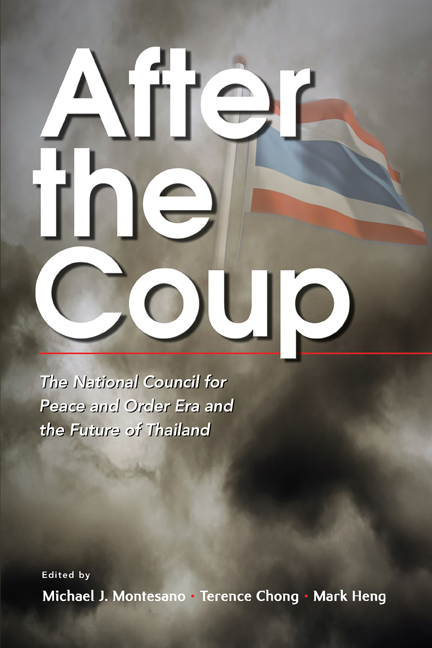Book contents
- Frontmatter
- Contents
- About the Contributors
- 1 Introduction: Thai Realities and Possibilities after the 22 May Coup
- 2 The Rise of the Thai Upper Middle Class and its Turn against Democracy
- 3 “We the Southerners Come to Protect the Nation and the King”: Southerners’ Political Rise and Regional Nationalism in Thailand
- 4 Exit, Voice, (Dis)loyalty? Northeast Thailand after the 2014 Coup
- 5 The Red Shirts and their Democratic Struggle in Northern Thailand, April 2010 – May 2015
- 6 The Shifting Battleground: Peace Dialogue in Thailand's Malay-Muslim South
- 7 Thailand's Zigzag Road to Democracy: Continuity and Change in Military Intervention
- 8 Murder and Regress: Violence and Political Change in Thailand
- 9 Thailand's Politics of Decentralization: Reform and Resistance before and after the May 2014 Coup
- 10 Change and Continuity in the Politics of the Media after the Coup
- 11 Thailand's Royal Democracy in Crisis
- 12 The Foreign Press and its Changing Perceptions of the Thai Monarchy
- 13 Thai Economic Growth: Retrospect and Prospect
- 14 Features and Challenges of an Ageing Population in Thailand
- 15 Conclusion: Thailand in Transition
- Bibliography
- Index
1 - Introduction: Thai Realities and Possibilities after the 22 May Coup
Published online by Cambridge University Press: 23 May 2019
- Frontmatter
- Contents
- About the Contributors
- 1 Introduction: Thai Realities and Possibilities after the 22 May Coup
- 2 The Rise of the Thai Upper Middle Class and its Turn against Democracy
- 3 “We the Southerners Come to Protect the Nation and the King”: Southerners’ Political Rise and Regional Nationalism in Thailand
- 4 Exit, Voice, (Dis)loyalty? Northeast Thailand after the 2014 Coup
- 5 The Red Shirts and their Democratic Struggle in Northern Thailand, April 2010 – May 2015
- 6 The Shifting Battleground: Peace Dialogue in Thailand's Malay-Muslim South
- 7 Thailand's Zigzag Road to Democracy: Continuity and Change in Military Intervention
- 8 Murder and Regress: Violence and Political Change in Thailand
- 9 Thailand's Politics of Decentralization: Reform and Resistance before and after the May 2014 Coup
- 10 Change and Continuity in the Politics of the Media after the Coup
- 11 Thailand's Royal Democracy in Crisis
- 12 The Foreign Press and its Changing Perceptions of the Thai Monarchy
- 13 Thai Economic Growth: Retrospect and Prospect
- 14 Features and Challenges of an Ageing Population in Thailand
- 15 Conclusion: Thailand in Transition
- Bibliography
- Index
Summary
The coup d’état staged by Thailand's military under the leadership of army commander General Prayut Chanocha on 22 May 2014 inaugurated the country's longest period of naked dictatorship in half a century.
Even before the duration of this spell of authoritarian rule in Bangkok became clear, other factors had already distinguished the 22 May putsch and its aftermath. For one, the campaign of political repression and ideological transformation launched by the self-proclaimed National Council for Peace and Order (NCPO, Khana raksa khwamsangop haeng chat) junta that seized power in the coup represented a notable break with what had followed Thai coups of the recent past. Above all, that campaign made this coup very different from the coup of 19 September 2006, which had ousted Thaksin Shinawatra from the premiership, and it left many observers of Thai affairs concerned that the junta was determined to entrench long-term military domination of the country and its politics.
A second factor shaped observers’ understandings of the NCPO, of its project and of the prospects for the success of that project from early on. Even at the time of the junta's seizure of power, it was evident that the end of the long life and long reign of King Bhumibol Adulyadej was near. In the event, the king passed away, at the age of eighty-eight, on 13 October 2016, after seventy years as Thailand's sovereign. His son Vajiralongkorn succeeded him, fully four and a half decades after being designated crown prince (Handley 2006, p. 249).
In social, political, cultural, economic, institutional, demographic and other terms, the Thailand that the new king inherited was a different country from that of 1946, from that of the decades of counter-insurgency in which his father had redefined the role of the Thai monarchy, from that of the heyday of Bhumibol's reign in the 1980s and 1990s, and even from that which had first elected Thaksin to the premiership in January 2001. The events of the decade and half since that election had left the NCPO, a segment of the Thai military, more broadly and a number of civilian interests that backed the junta and its seizure of power determined to pursue a certain vision of Thailand's political and social orders.
- Type
- Chapter
- Information
- After the CoupThe National Council for Peace and Order Era and the Future of Thailand, pp. 1 - 23Publisher: ISEAS–Yusof Ishak InstitutePrint publication year: 2019



